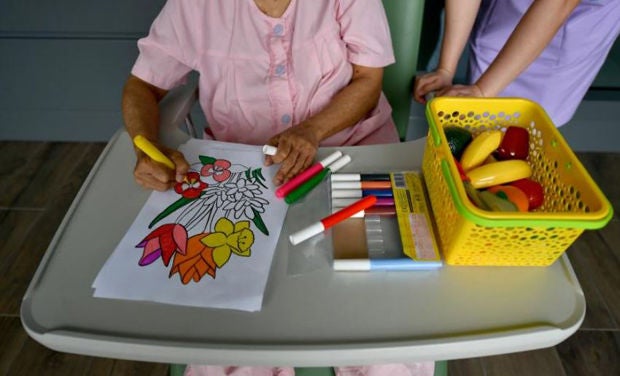
A demonstration of a therapy session at Changi General Hospital's dementia ward. One in 10 local seniors aged 60 and above has dementia. ST PHOTO: LIM YAOHUI
SINGAPORE - These are the three new initiatives that the Ministry of Health (MOH) will be rolling out as part of the 2022 Budget.
Sharing patients' data across different settings
To help family physicians to better track their patients' condition and health trends over time, MOH has been developing a National Electronic Health Record which will synchronise information and enable access to patients' data by their care team, across different settings.
Health Minister Ong Ye Kung told Parliament on Wednesday (March 9) that aside from having access to these medical records, family doctors must also be able to share these records with other providers.
"We want to work towards a scenario that no matter where you are receiving care, for example, at GPs or dental clinics, polyclinics, hospitals, specialist clinics, nursing homes, and eldercare centres, the same data could be retrieved to support your care," said Mr Ong.
This comes as the Ministry looks to transform primary care - the first line of care in the community - to an even more important pillar of the healthcare system, by integrating primary care providers such as general practitioners into the system. Only three in five Singaporeans currently visit a regular doctor.
With more people accessing this shared data, and to facilitate secure data sharing, new legislation will be put in place over the next few years to govern this - known as the Health Information Bill.
Artificial intelligence for diagnosing dementia
One in 10 local seniors aged 60 and above has dementia.
However, family members or the sufferer are often unaware about the condition until the disease has become more advanced, missing the chance for early intervention.
This is partly due to early symptoms being subtle, and requiring specialised tests, which can only be administered by a trained healthcare professional.
To support the earlier detection of dementia, Project Pensieve, a technology-driven initiative, was launched.
Tapping on local clinical and technology expertise, an inter-agency team is developing a digital drawing test to estimate the risk of dementia automatically using artificial intelligence in just about 10 minutes.
Dr Liew Tau Ming, a psychiatric consultant at the Singapore General Hospital, said that the new digital tool analyses how seniors draw certain shapes and symbols.
"This is based on previous research which has shown that certain drawings, as well as the drawing sequence, can be informative in determining whether a person is at high risk of dementia," he added.
Seniors found to have dementia will be referred to the Memory Clinic of Singapore General Hospital for further management, said Dr Liew, who is the project's clinical lead and principal investigator.
With the seniors' consent, the Silver Generation Office - the outreach arm of the Agency for Integrated Care - will also reach out to them to discuss referrals to other community services, he added.
"Previous research has shown that timely dementia care can improve the well-being of seniors and prevent premature nursing home placement," said Dr Liew.
Around 1,000 seniors will be recruited for this phase of research which will begin next month, to validate the initial AI prototype.
The tool is expected to be ready after 2024 for wider community use, he added.
Innovative assisted living models
A new site at Parry Avenue in Kovan will be launched for sale by public tender in the coming months, to develop innovative assisted living models that support seniors through a continuum of care as well as their physical and mental well being.
Assisted living models in public housing, also known as Community Care Apartments, allow seniors to buy a home bundled with customisable care services like housekeeping services and 24/7 emergency support.
The Community Care Apartments launched in Bukit Batok last year was oversubscribed, with more than four seniors applying for each flat. The flats are expected to be completed in 2024.
So MOH, the Ministry of National Development and Urban Redevelopment Authority have been looking to expand the suite of such models to private developments.
MOH said that the launch will leverage the strengths of private stakeholders in the assisted living ecosystem, and to further support seniors' aspirations to age-in-place.
Contributed by













